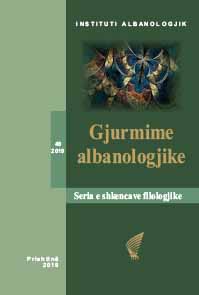NYJA NDËRTEKSTUALITETI BIBLIK NË POEZINË BASHKËKOHORE SHQIPE
BIBLICAL INTERTEXTUAL THREADS IN CONTEMPORARY ALBANIAN POETRY
Author(s): Zahrie KapllanajSubject(s): Language and Literature Studies, Poetry, Theology and Religion, Albanian Literature, Biblical studies, Theory of Literature
Published by: Instituti Albanologjik i Prishtinës
Keywords: Contemporary Albanian poetry;religious code;Biblical code;intertextuality;
Summary/Abstract: The religious code, especially the Biblical one, has permeated Albanian literature from its beginnings to today’s literature. Ever since its origin, Biblical writing has been a main textual and hypertextual source. The intertextual communication with it has continued in other literary periods by different routes: through semantic, morphologic, syntactic, stylistics and other refunctionalizations. The intercommunication between Contemporary Albanian Poetry and the Biblical code is evident and pivotal. It appears as a polysemantic and multidimensional intercommunication. In The Anatomy of Criticism, Northrop Frye states that Western literature has been influenced by the Bible more than any other book.1 Albanian literature also works within such an order of intercommunication, at certain times more than others, by using a method or two, but such a communication has certainly been continuous. Initially, the interrelation to texts i.e. to Biblical lessons has had a didactic and moralizing character (Old literature), then it has evoked the presence of a western culture in Albanians and the interrelation to nationality (in Romanticism), after which it has denoted a parodist and allegoric nature (Modern Literature). In Contemporary Poetry, biblical references are either direct or indirect, but they always take a new force of expression through a new semantics, which in the first phases has a national character, then it goes beyond it as it moves to a personal and universal level. There are very few identifiable cases in Contemporary Albanian Poetry that display a complete intertextual web as a system which then joins the intentional cooperation with other intertextual codes, as is the case with Musa Ramadani’s poetry or the poetry of a few other poets. Usually it occurs sporadically, distributed unevenly hither and thither in poetic volumes of various authors who merge this intercommunication with other poetic interests and ideas. By joining the examples in Contemporary Poetry which are analyzed in this article, i.e. in the instances of poems displayed here, this paper concludes that the intercommunication between today’s poetry and the Biblical code produces and results in these literary characteristics: - Enforcing the national code through a newsemantization of biblical concepts, as is the case with AzemShkreli’s poetry. The expression is symbolic and allegorical. - Cluttering the divine nature of these biblical figures and by merging them, creating the cult of man and the human, as in the case of the poetry of AzemShkreli and SabriHamiti. - The touch of irony. Irony and criticism of actual wild and chaotic reality (human and political), as in the poetry of AgimVinca and Fatos Arapi. Reiterating biblical figures in order to layer the universal nature of particular phenomena in life and in literature, as inherited or as interrelated to human genetics.
Journal: Gjurmime Albanologjike - Seria e shkencave filologjike
- Issue Year: 2019
- Issue No: 49
- Page Range: 231-244
- Page Count: 14
- Language: Albanian
- Content File-PDF

